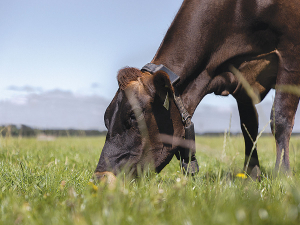Another Aussie state market opens for Halter
Another Australian state has given the green light to virtual fencing, opening another market for Kiwi company Halter.
 Halter claims its collars have been a massive stress reliever, especially during the Covid restrictions.
Halter claims its collars have been a massive stress reliever, especially during the Covid restrictions.
Solar-powered smart cow collar manufacturer Halter claims it will help combat the country's acute labour shortage when it expands into Taranaki, Southland, Otago and the Central Plateau next month.
The company says its growth is in response to significant demand from the industry, and comes off the back of its successful launch into Canterbury late last year.
Despite eased border restrictions and changes to the class exception scheme, demand for workers continues.
In January, the industry predicted it would be short of between 4,000 and 6,000 workers this year alone.
The company says smart solutions like its collar, which it says can save farmers up to 20-40 hours a week, will relieve some of the unrelenting pressure to recruit.
"It means owner-operators can effectively and sustainably run small farms single-handedly, and on bigger stations, it offers farmers the opportunity to operate at a higher level."
The GPS-enabled collars enable farmers to automate herd movements, reducing on-farm workload.
Halter business development manage Steve Crowhurst says the collars have been a massive stress reliever, especially during the red setting of the Covid-19 Protection Framework.
"We've been able to support farmers to run 750-cow, 3-mob farms with just two people, and still manage to maintain normal output and sustainable hours."
Jo Sheridan, the demonstration manager at Owl Farm - a 160ha dairy farm, a joint venture between St Peter's School Cambridge and Lincoln University, says the product has reduced hours, and allowed the entire team to see everything that's happening on the farm.
"By no longer needing two people milking and getting cows in we have more options to carry out other work on farm and offer flexible, sustainable time off."
On larger farms like Canterbury's Craigmore Group, one of the largest corporate farming operations in the country, it means they can offer farmers an improved work-life balance without compromising on production.
The current industy benchmark states one full-time worker is required for every 173 cows, but Craigmore is now able to manage 260 cows per full-time worker, all with sustainable hours. Matt Redmond, farm business manager on a 147ha, 520 cow Craigmore farm in the Culverden Basin, North Canterbury, says the company adopted Halter because they're passionate about sustainability and worker welfare.
"We've been able to offer staff a better working life. Rather than spending hours sitting behind cows, our workers can spend more time on high-value management and big picture tasks."
He says the cows are also calme without having the noise and pressure of a motorbike and dogs behind them.
The World Wide Sires National All Day Breeds Best Youth Camp Best All Rounder plaudit has become family affair, with 2026 Paramount Cup winner Holly Williams following in her sister Zara's footsteps.
DairyNZ is giving New Zealand farmers a unique opportunity to gain hands-on governance and leadership experience within the dairy sector.
Herd improvement company LIC has posted a 5.2% lift in half-year revenue, thanks to increasing demand for genetics.
According to the latest Fresh Produce Trend Report from United Fresh, 2026 will be a year where fruit and vegetables are shaped by cost pressures, rapid digital adoption, and a renewed focus on wellbeing at home.
The Roar is a highlight of the game hunting calendar in New Zealand, with thousands of hunters set to head for the hills to hunt male stags during March and April.
OPINION: The past few weeks have been tough on farms across the North Island: floods and storms have caused damage and disruption to families and businesses.
OPINION: Fonterra may be on the verge of selling its consumer business in New Zealand, but the co-operative is not…
OPINION: What does the birth rate in China have to do with stock trading? Just ask a2 Milk Company.